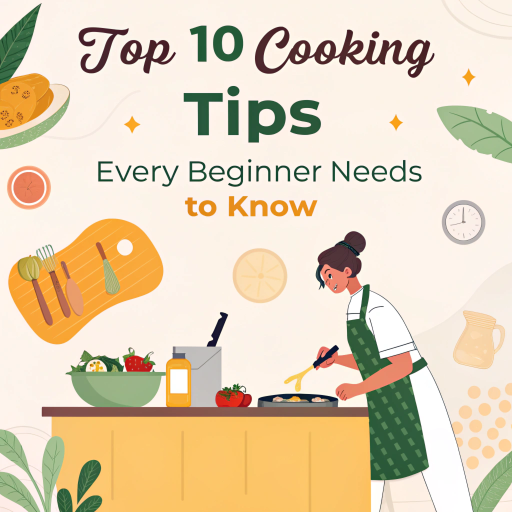Introduction
Cooking is an essential life skill that everyone should learn. Whether you’re a complete novice or have some kitchen experience, mastering the basics can transform your culinary journey. This guide provides you with top cooking advice for beginners, ensuring you start your kitchen adventures on the right foot. From understanding basic techniques to stocking your pantry with essentials, we’ve got you covered with everything you need to know to become a confident cook. Let’s dive into the world of cooking with these essential tips!
Table of Contents
Essential Cooking Tips for Beginners
1. Start with Simple Recipes
Starting your cooking journey with simple recipes is crucial. Not only does it build your confidence, but it also allows you to understand fundamental cooking techniques without feeling overwhelmed. Try making scrambled eggs, pasta dishes, or stir-fried vegetables as your first meals. These recipes are straightforward and forgiving, providing a perfect foundation for your culinary skills. Additionally, there are plenty of online resources and cookbooks tailored for beginners to help you get started.
2. Invest in Quality Kitchen Tools
Having the right tools can make a world of difference in your cooking experience. Investing in a few high-quality kitchen essentials, such as a sharp chef’s knife, a sturdy cutting board, and reliable pots and pans, can significantly improve your efficiency and enjoyment in the kitchen. Quality tools not only make cooking easier but also ensure better results. Remember to take care of your tools by keeping them clean and properly stored to maintain their longevity.
3. Understand Basic Cooking Techniques
Familiarizing yourself with basic cooking techniques is the key to becoming a proficient cook. Techniques such as boiling, sautéing, roasting, and steaming are the building blocks of countless recipes. Start by mastering one technique at a time, and practice with different ingredients to see how they react to various methods. For example, learn how to sauté vegetables until they’re tender and flavorful, or roast chicken to achieve a crispy, golden-brown skin. Watching tutorial videos or taking a basic cooking class can also be incredibly helpful in understanding these techniques.
Basic Ingredients Every Beginner Should Use
4. Stock Your Pantry with Essentials

A well-stocked pantry is the backbone of easy and efficient cooking. Start by gathering essential items such as olive oil, salt, pepper, garlic, canned tomatoes, and a variety of spices like cumin and paprika. These staples can be used in numerous dishes, making it easier to whip up meals on the fly. Having a variety of grains, beans, and lentils will also provide a solid base for many recipes. By keeping these basics on hand, you’ll always have the ingredients needed to create a delicious meal without the stress of last-minute shopping.
5. Learn to Cook with Fresh Produce
Fresh vegetables and fruits are key components of a healthy diet and can greatly enhance the flavor of your meals. When shopping for produce, look for seasonal items as they are often fresher and more affordable. Learn how to properly store fruits and vegetables to extend their shelf life. For example, keep leafy greens in the fridge in a damp paper towel to prevent wilting. Incorporate fresh produce into your meals by making salads, stir-fries, and smoothies. The vibrant flavors and textures will make your dishes more enjoyable and nutritious.
Mastering Meal Preparation

6. Plan Your Meals Ahead
Meal planning is a game-changer for beginners. It not only saves time and money but also reduces food waste and ensures you have nutritious meals throughout the week. Start by planning your meals for a few days at a time, making a list of the ingredients you’ll need. Prepare ingredients in advance, such as chopping vegetables or marinating proteins, to make the actual cooking process quicker and smoother. Consider using meal planning apps or templates to stay organized and on track.
7. Practice Mise en Place
Mise en place, a French term meaning “everything in its place,” is a fundamental practice in professional kitchens that can greatly benefit home cooks. It involves preparing and organizing all your ingredients before you start cooking. This means chopping vegetables, measuring spices, and having all tools ready at hand. Practicing mise en place helps streamline the cooking process, minimizes stress, and reduces the likelihood of mistakes. It ensures that you can focus on the cooking itself, making it a more enjoyable and efficient experience.
8. Cooking in Batches
Batch cooking is an excellent strategy for beginners, especially if you have a busy schedule. By cooking large quantities of food at once, you can have meals ready for several days, saving time and effort. This method is particularly useful for dishes like soups, stews, and casseroles, which often taste even better the next day. Store your batch-cooked meals in portioned containers, making it easy to grab and reheat. Batch cooking not only helps maintain a healthy diet but also reduces the temptation to order takeout.

Cooking Safety and Hygiene
9. Practice Food Safety
Understanding and practicing food safety is crucial to prevent foodborne illnesses. Always wash your hands before and after handling food, especially raw meat and poultry. Use separate cutting boards for raw meat and vegetables to avoid cross-contamination. Cook food to the appropriate temperatures to ensure it is safe to eat, using a food thermometer if necessary. Store leftovers properly in airtight containers and refrigerate them promptly. By following these food safety guidelines, you can enjoy your meals with peace of mind. For detailed guidelines and tips on food safety, check out the Food Safety Education from the USDA.
10. Maintain a Clean Kitchen
Keeping your kitchen clean is essential for both safety and efficiency. Start by cleaning as you go; wipe down surfaces and wash dishes while you cook to prevent a large mess from accumulating. Regularly clean kitchen tools and appliances, including your oven, microwave, and refrigerator. Use a checklist to ensure you cover all areas, such as sanitizing countertops and mopping the floor. A clean kitchen not only makes cooking more pleasant but also helps prevent contamination and foodborne illnesses.
Enhancing Flavors and Presentation
11. Experiment with Spices and Herbs
Spices and herbs are the secret weapons of flavorful cooking. They can transform simple ingredients into extraordinary dishes. Begin by experimenting with basic spices like cumin, coriander, and paprika, as well as herbs like basil, thyme, and cilantro. Understand the flavor profiles of different spices and herbs, and how they complement various ingredients. Create your own spice blends or try out new recipes that highlight specific seasonings. The more you experiment, the more confident you’ll become in enhancing the flavors of your dishes.
12. Master Basic Seasoning Techniques
Proper seasoning is key to making food taste delicious. Start with the basics: salt and pepper. Salt enhances the natural flavors of ingredients, while pepper adds a bit of heat and complexity. Learn to season food throughout the cooking process rather than just at the end. Use acids like lemon juice or vinegar to balance flavors and brighten dishes. Taste your food as you cook and adjust the seasoning as needed. With practice, you’ll develop a keen sense of how to season food perfectly.
13. Focus on Presentation
While taste is paramount, the presentation of your food can elevate the dining experience. Simple techniques like using colorful ingredients, arranging food neatly on the plate, and adding garnishes can make your dishes look more appetizing. Pay attention to portion sizes and the balance of colors and textures on the plate. Use herbs, edible flowers, or a drizzle of sauce to enhance the visual appeal. Beautifully presented food not only looks inviting but also shows care and effort, making your meals more enjoyable.
Conclusion
Recap the key points of the article, encouraging readers to practice the tips shared. Emphasize the importance of patience and experimentation in the kitchen, as cooking is a skill that improves with time and practice. Invite readers to share their cooking experiences and ask questions in the comments section. Encourage them to keep exploring and enjoying the journey of learning to cook.
FAQs: Top Cooking Advice for Beginners
What are the easiest recipes for beginners to start with?
Simple recipes like scrambled eggs, pasta dishes, stir-fried vegetables, or basic salads are ideal for beginners. They require minimal ingredients and techniques, making them perfect for building confidence.
What kitchen tools are essential for beginners?
Essential tools include a sharp chef’s knife, a sturdy cutting board, a non-stick frying pan, a saucepan, and measuring cups/spoons. Investing in quality tools ensures better results and makes cooking more enjoyable.
How can I learn basic cooking techniques?
Start by practicing fundamental methods like boiling, sautéing, roasting, and steaming. Watch online tutorials, take a basic cooking class, or follow beginner-friendly cookbooks to build your skills.
What ingredients should I always have in my pantry?
Staples like olive oil, salt, pepper, garlic, canned tomatoes, spices (e.g., cumin, paprika), grains, and beans are essential. These items provide a base for many recipes and allow for quick meal preparation.
How do I cook with fresh produce?
Choose seasonal fruits and vegetables for better flavor and affordability. Learn proper storage techniques, like keeping leafy greens in damp paper towels, to extend their freshness. Incorporate them into salads, stir-fries, or smoothies.
What is meal planning, and how does it help beginners?
Meal planning involves organizing your meals for the week, listing ingredients, and prepping ahead. It saves time, reduces food waste, and ensures you have healthy meals ready, making cooking less stressful.
What does ‘mise en place’ mean, and why is it important?
‘Mise en place’ means “everything in its place.” It involves preparing and organizing ingredients before cooking. This practice streamlines the cooking process, minimizes mistakes, and makes cooking more efficient.
How can I make cooking faster and easier?
Batch cooking, prepping ingredients in advance, and using simple recipes can save time. Tools like food processors and slow cookers can also speed up meal preparation.
How can I improve food safety in the kitchen?
Wash your hands regularly, use separate cutting boards for raw meat and vegetables, and cook food to the proper temperatures. Store leftovers promptly in airtight containers to avoid spoilage.
How do I enhance the flavors of my dishes?
Experiment with spices and herbs to elevate flavors. Season with salt and pepper throughout the cooking process. Use acids like lemon juice or vinegar to balance flavors and add brightness to dishes.
What’s the best way to present food for beginners?
Use colorful ingredients, arrange food neatly on the plate, and add simple garnishes like fresh herbs or a drizzle of sauce. Focus on balance and clean plating to make dishes more visually appealing.
How do I stay motivated to cook regularly?
Start with recipes you enjoy eating, set small cooking goals, and involve family or friends in the process. Celebrate your progress, experiment with new flavors, and remember that cooking gets easier with practice.


1 thought on “Top 10 Cooking Advice Every Beginner Needs to Know”